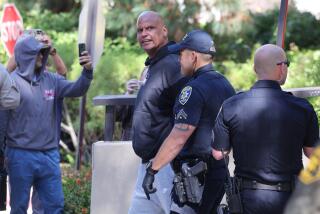Government’s Job Is Not to Be Editor : TV station’s San Quentin execution lawsuit fights the specter of government censorship
- Share via
When San Quentin Prison Warden Daniel Vasquez last year imposed a total ban on press coverage of Robert Alton Harris’ yet unscheduled execution for murder, he broke with longstanding precedent about who determines who can cover the news. Friday a federal district court judge in San Francisco is expected to decide whether Vasquez’s action violated the First Amendment’s guarantee of press freedom. We think it did.
The warden had invited news organizations to apply for 14 spots that would be reserved for reporters to witness the Harris execution. The last California execution occurred in 1967; past practice was for the warden to determine access to an execution. But Vasquez turned over the selection to then-Gov. George Deukmejian’s press secretary, who played favorites in inviting members of the media.
The warden also banned the use of “reporters’ tools,” including TV cameras. And that triggered a lawsuit by San Francisco public television station KQED. Rather than defend his actions in court, Vasquez decided to ban all reporters.
The warden’s actions constitute intolerable interference with the press. The U.S. Supreme Court has long held that government officials do not have unrestricted discretion to choose who can report the news. Moreover, the court has increasingly upheld First Amendment rights of the public and press to view certain governmental proceedings once closed (for example, pretrial hearings).
According to the court, the press can be excluded only when a proceeding has historically been private and no useful public purpose would be served by opening it. Neither criteria clearly applies in KQED’s challenge.
KQED’s critics, including some members of the Legislature, argue that allowing press access to the execution might produce coverage that the public would find objectionable.
That may be true, but it is irrelevant: The decision to cover any grisly news event, whether a murder or an accident, is often a difficult one. There’s no substitute for sound editorial judgment and for insisting that news organizations avoid exploiting the news, and their First Amendment freedoms. But the decision to not televise an execution is for the media to make, not the government.
Allowing the government to decide is a slippery slope. At the bottom of that slope are newspapers and TV stations that are no longer free. The government must not be permitted to decide who in the press has access to information and in what form it can be delivered: The right to choose who covers the news is also the right to determine how the news is covered.
More to Read
Sign up for Essential California
The most important California stories and recommendations in your inbox every morning.
You may occasionally receive promotional content from the Los Angeles Times.









